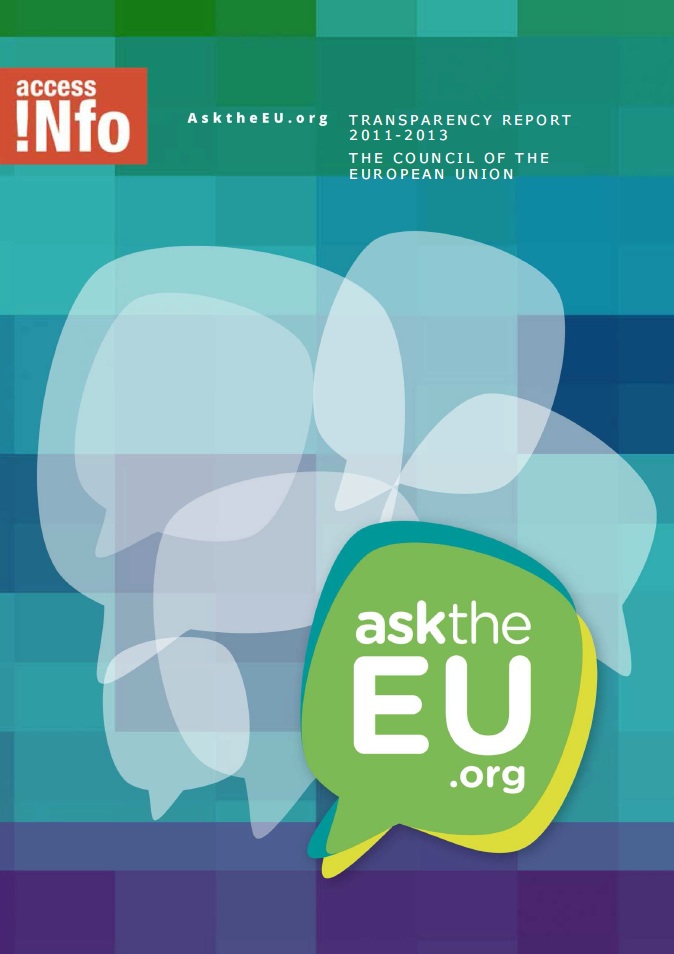The Council of the EU is failing to comply with EU transparency rules by not respecting time frames for responding, applying too many extensions to requests, and not informing all requesters of their right to appeal when information is denied, according to a report published today by Access Info Europe.
Analysis of 50 access to documents requests submitted to the Council between 2011 and 2013 via the AsktheEU.org platform, found that the average time for answering was 20 working days, significantly over the maximum 15 working days permitted by EU law. Requests which resulted in partial denials of information were answered in an average of 49 working days. Excessive use was made of extensions which were applied in a full 32% of cases.
Click here to read the report. ![]()
Analysis of the requests found that the majority sought information about the decision-making process, something which the EU treaties mandate should be as open as possible. In spite of this, only one third of requests (19 requests or 28%) were successful, resulting in the full disclosure of documents to the person seeking it.
This report also raises concerns about the broad application of exceptions such as privacy and international relations. The privacy exception was used to deny information about the identities of Member State representatives participating in Council meetings, even on legislative negotiations. The international relations exception was invoked to deny public access to multiple documents about the Council’s interactions with third countries such as China and Mexico.
A further issue was that of record keeping: the Council informed requesters that it does not keep minutes of all working parties and in one instance reported that legal advice had only been delivered to Member State representatives orally.
The concerns about transparency of the Council set out in this report, come shortly after Access Info Europe won a five-year legal battle before the European Court of Justice for access to a document containing the names of Member States putting forward proposals for reform of the EU’s transparency rules. The Court upheld Access Info Europe’s arguments that the information was essential to be able to participate in Council decision-making processes and to hold the EU to account. In spite of this win, the data collected on AsktheEU.org reveals a series of problems with transparency of the Council which impede public participation and scrutiny of its activity and constitute violations of treaty requirements for EU institutions to work as openly as possible. A constructive dialogue on Access Info’s findings was also held with the Council of the EU, prior to publishing this report findings.
One of the issues identified was the need for the Council to consult with third parties (including EU Member States and other countries) before responding to requests, which impacts negatively on response times. This discussion revealed a further issue of some of the requests sent via AsktheEU.org were not handled under Regulation 1049/2001 despite requesters specifically quoting the regulation. The report contains a series of recommendations as to how to address these issues. Access Info Europe recommends that the Council of the European Union should:
» Proactively publish relevant information about its decision-making process, policies and administrative information;
» Inform requesters of their rights, including in particular the right to appeal when information is denied;
» Respect the 15 working day deadline for responding to requests, reducing it from the current average of 20 working days;
» Limit the use of extensions to exceptional cases and respect the maximum additional 15 working day deadline;
» Avoid artificial distinctions between access to documents requests which are processed under Regulation 1049/2001 and which therefore include the possibility to appeal, and access to information requests which are currently dealt with under the guidelines on good administration and which have no legal remedy in case the requester is not satisfied;
» Ensure that exceptions are applied narrowly and with due regard for the public interest in transparency, participation and accountability;
» Improve record keeping, ensuring, inter alia, that full records are kept of meetings which are part of legislative processes and where legal advice is delivered.

